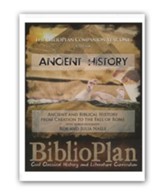With 5 children ranging in ages from 13 to 3, homeschooling can be time-consuming and frustrating. If I am juggling 4 different grade levels and curriculum choices, I will quickly get burnt out. Here is my quick story:
I tried separating my children by grade level for every subject this year - and it didn't work very well. I swapped some curriculum, but still tried to keep them separate, and it still didn't work. I felt like we were disconnected - we were all headed in different directions each morning and never met back up in a central location. I couldn't keep up with what my 7th grader was learning in history and science because I was too busy reading history to my 2nd grader. We were all on different pages; heck, we were in different books!
I prayed about it, and I felt like the Lord was leading me back to multi-age learning. I was kind of skeptical - after all, how can I teach a 7th grader and a non-reading Kindergartener at the same time? Was there even a curriculum that reached this age level? Would one of them suffer, or all of them? And, weren't 7th graders supposed to be independent?
Then I remembered that we have always done it the multi-age way. We used Apologia science one year, Mystery of History one year, My Father's World one year, and then I just wrote my own curriculum to reach the different age gaps. {That was time-consuming.} We read books together, did nature study together, made lapbooks together, learned scripture together. And, I remembered that it worked. All of the children learned and thrived. We were all united in our learning; we helped each other. We had fun. I felt more relaxed and wasn't being pulled in so many different directions. I was learning right along with the children because I was the teacher as opposed to teachers.
After contemplating how our year had gone this year as opposed to previous years, I decided that multi-age learning is what works for our family. I researched some different curriculum, and thanks to a sweet lady on the Crew, found BiblioPlan. I had never heard of them before! I downloaded the first three weeks for free and liked what I saw. We put away our other history textbooks, and since I already had the spines needed to compliment BiblioPlan, I decided to start right away. And after the third day of using it, I ordered the physical copy!

It works for our family. We all sit down at the table right after breakfast together. I read aloud from the Bible, the BiblioPlan Companion, the Story of the World, and other history books. We complete assignments together based on skill. The older ones may have a creative writing assignment while the younger ones do copy-work. The younger ones may draw a picture while the older define vocabulary words. We all do notebooking pages, memorization, discussion, and we all have a good time together. Afterward, we do our nature study journals together; even I have my own! We draw diagrams of trees and leaves, and talk about pollination of flowers, and laugh and giggle while we draw. When we are through with nature study journaling, we disperse to complete grammar and math, cursive and Bible study. I work with my 5 year old on phonics and math, and I play with my 3 year old.
And you know what? We are all learning; we are all thriving. Our day flows much better, and we connected on a deeper level. We can discuss what we are learning throughout the day, and nobody feels left out. We can work on projects together, and the kids can help each other with difficult assignments. I have more time to devote to history and science when I am only preparing for and teaching one lesson plan. We can have great discussions and research the answers to tougher questions together. Most of all, I love having all of my children at the table, together, learning. reading, living, connecting.
Multi-age learning works for us, and we will not turn back.





Yes, we love multi- age learning (of course mine are not nearly as spread out in age yours) but I do find it gives them something to talk about. They have more connections and things in common and inevitably they all come away from the table having learned something just a bit different because they all take in and process the information in a different/ personal way. Plus it is much less time consuming!
ReplyDeleteExactly! It is less time consuming and less intellectually draining for me! Trying to teach {and learn, haha} four to five different history programs and science lessons....um, I just can't do that! Plus, I love the together time we have.
Delete